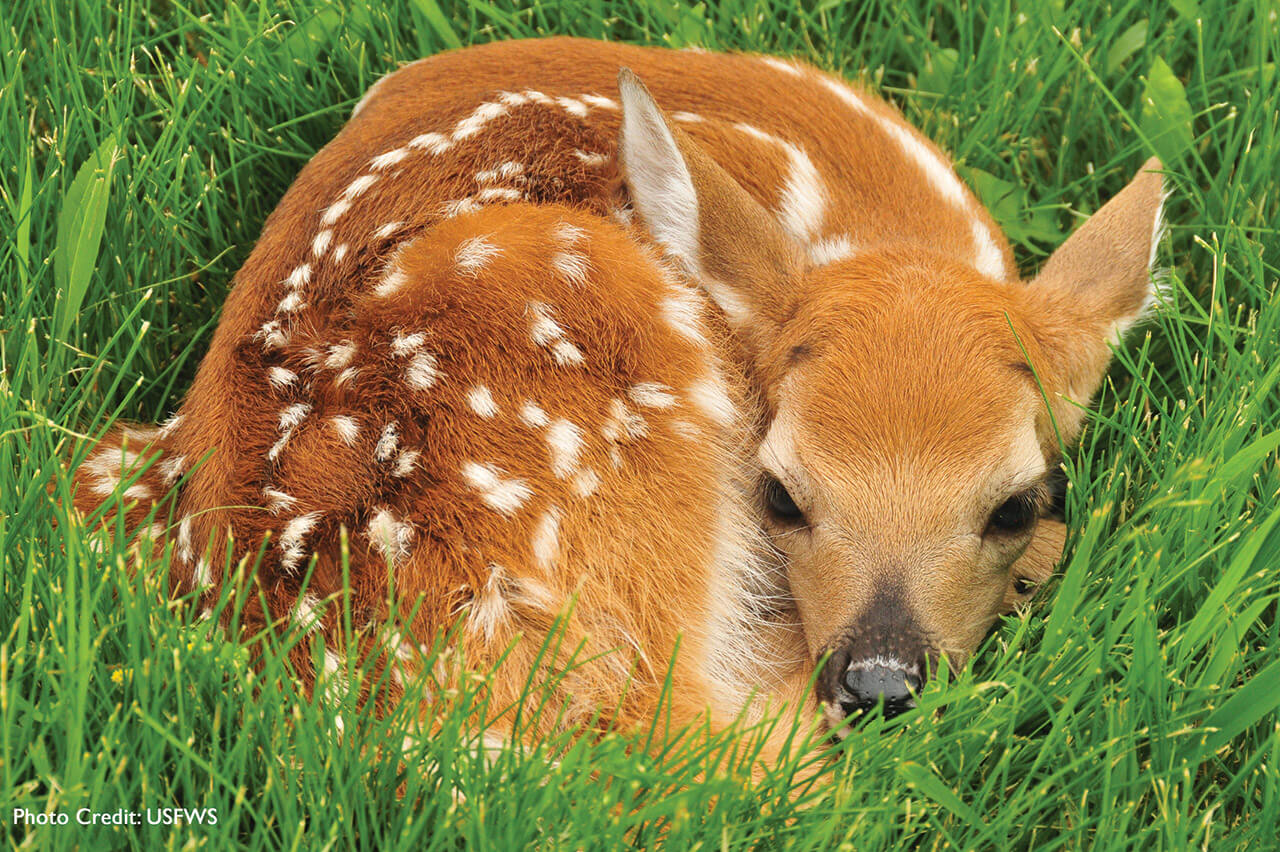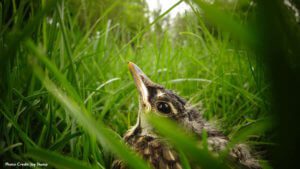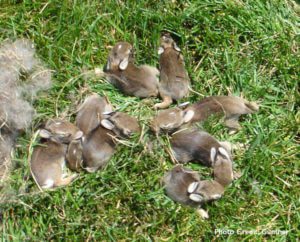Leave Baby Wildlife Alone: If You Care, Leave Them There

Repurposed from NC Wildlife Resource Commission’s “Resist Urge to “Rescue” Baby Wildlife” news release and website.
Cute baby bunnies are a staple of Easter, but taking young rabbits out of your yard and into your home will likely do more harm than good. Well-meaning people often put young wildlife’s health in danger when they intervene in a wild animal’s natural process of growing up.
As people begin to garden and play in their yards this spring, they may stumble upon young bunnies, fawns, and fledgling birds mistakenly thought to be abandoned. The natural response for most people will be to help, but in most cases, one or both parents are a short distance away searching for food and will only return when the coast is clear.
“Wild parents can’t hire a babysitter, so most young animals spend a lot of time on their own well before they can fend for themselves,” said Falyn Owens, extension biologist at the Wildlife Commission. “When the mother returns, sometimes many hours later, she expects to find her young where she left them.”
Owens advises that if you truly feel the animal needs help, the best thing you can do is leave it alone (or put it back) and call a wildlife rehabilitator for advice.
Signs of abandoned vs. natural “nesting” behavior
Nests or offspring disturbed by humans can be compromised; however, that’s not always the case. The babies could die because of intervention or lack thereof. Therefore, it’s good to know when and if to step in.
If a young animal is alone and you can’t see the adult, it doesn’t mean the baby is orphaned. Many adults leave juvenile animals alone for long periods, so it’s best to give them the chance to reestablish contact and take care of their offspring. Leave the animal or nest alone for 24 to 48 hours to determine if mom is returning.
Birds

Knowing the difference between a nestling and a fledgling can help you make the right decision if you see a young bird on the ground. Nestlings don’t have their feathers yet and can’t survive outside of their nest for long. Fledglings have their feathers and can walk, hop, or fly short distances; they might appear helpless but have already left the nest and are being cared for by their parents — typically at a distance.
“If you find a nestling on the ground, return it to the nest as quickly as possible if you can find it,” Owens said. “If the entire nest has fallen, you can place it back in the tree or even construct a makeshift nest.”
Fledglings, however, should be left alone in most cases. They are busy with the critical tasks of learning to fly and survive independently. If a fledgling isn’t obviously injured or in any immediate danger, leave them to it. Like human toddlers, young birds need tons of practice to gain the muscles and coordination to become graceful adults. Keeping cats inside and dogs on leash are the best way to ensure these young birds make it through this vulnerable learning stage.
Rabbits
Newborn rabbits (kits) spend their first few weeks hiding in plain sight, in shallow holes tucked among clumps of thick grass, under shrubs, or in the middle of open lawns. Rabbit nests can be hard to spot, often resembling a small patch of dead grass. Female rabbits (or does) actively avoid their nests and only visit once or twice a day for a few minutes, to avoid attracting the attention of hungry predators.
“We hear from concerned people every spring who say they’ve found an abandoned nest of bunnies when in fact, the kits are just fine and quietly waiting for the doe to return,” Owens said. “If they appear to be healthy and unharmed, the best thing you can do is cover up the nest and walk away. The mother won’t return until well after you have left the area.”
Tip: Place some thin twigs or dental floss in a tic-tac-toe pattern over the nest. Watch the kits from a distance to see if the mom returns. If the twigs or floss are disturbed, you’ll know she’s been there. If she doesn’t visit in the next 24 hours, the nest may be abandoned.
When juvenile rabbits leave the nest and are starting to learn how to survive on their own, it might appear they need help because they’re hopping around awkwardly. If they’re in a dangerous location, move them to the nearest safe place. Otherwise, leave them alone.

People who come across a nest may think the baby rabbits (kits) are abandoned. No matter how tempting it might be to “help” them, if the kits appear uninjured, cover the nest and walk away. Female rabbits will avoid approaching the nest if they think you or another threat is nearby.
Tip: Place some thin twigs or dental floss in a tic-tac-toe pattern over the nest. Watch the kits from a distance to see if the mom returns. If the twigs or floss are disturbed, you’ll know she’s been there. If she doesn’t visit the next 24 hours, the nest may be abandoned.
3 signs young wildlife may be orphaned
- Healthy wildlife babies waiting for their mom to return are usually quiet, so predators don’t find them. If a wildlife baby is crying or making a lot of noise, it might be orphaned.
- When mom takes care of the baby, she’ll keep insects away. If you notice insects on a baby, it may indicate it’s orphaned.
- If babies go too long without eating, they can get cold and dehydrated. Wrinkled skin is a sign the baby hasn’t been fed and is likely orphaned.
Leave wildlife care to the experts
Keep in mind, in North Carolina it’s illegal to keep most wildlife species without a permit. Leave wildlife care to the experts. Avoid wildlife contact and don’t attempt to raise an orphan.
Only wildlife rehabilitators have the proper licensing and training to care for wild animals until they can be released back into their natural habitat. They dedicate their time and resources to caring for orphaned and injured animals. Note: Certain species of wildlife, such as raccoons, foxes, adult white-tailed deer, adult black bear, coyote, nutria and feral swine, cannot be rehabilitated in our state.
Additional WRC resources
Injured and Orphaned Wildlife (includes FAQs)
- What should I do if I find injured wildlife?
- I found a baby animal. What should I do with it?
- There is a fawn lying alone. Is it OK?
- If I touch a baby bird, will the mother abandon it?
- How can I protect my pet from wildlife?
- How can I become a wildlife rehabilitator?
- What are the consequences of feeding wildlife?
- Who picks up dead animals?
Tips on “orphaned” baby squirrels
If you see a severely injured white-tailed deer or black bear, contact the NC Wildlife Helpline at 866-318-2401 (Mon-Fri. 8 a.m. – 5 p.m.) or the Wildlife Enforcement Division at 800-662-7137 (outside of business hours).

